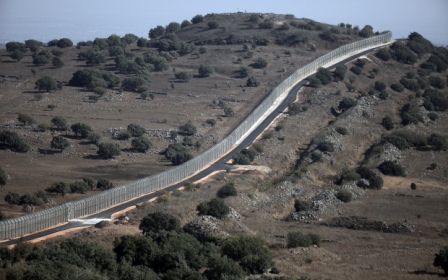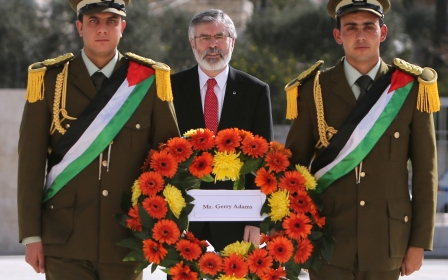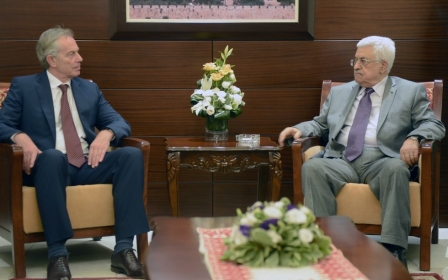Israel to build new settler homes and electricity to be cut to the West Bank

The Israeli government on Friday published tenders to build 430 new settler homes in the occupied West Bank, the head of an NGO that monitors settlement activity told AFP.
"It's the opening of the settlement floodgates," said Daniel Seidemann, head of the Terrestrial Jerusalem group.
He said that the latest plans were the first to be announced in several months but unlikely to be the last before the 17 March general election, in which Prime Minister Benjamin Netanyahu's Likud is competing with other right-wing parties for the settler vote.
"This could hardly be an accident," Seidemann said. "It could not have taken place without Netanyahu's knowledge and consent."
He added that the new homes were to be built in four existing settlements across the West Bank - 112 in Adam, 156 in Elkana, 78 in Alfei Menashe and 84 in Kiryat Arba.
Building settlements in the Occupied Palestinian Territories is illegal under international law and opposed by the United States and the international community as an obstacle to an eventual peace deal with the Palestinians.
A senior Palestinian official denounced the plan.
"What the Israelis announced is part of a wider war... against the Palestinian people," Palestine Liberation Organisation (PLO) official Wassel Abu Yusef told AFP.
"This is a war crime which should push the settlements issue to the International Criminal Court."
Seidemann, whose group particularly monitors settlement in Israeli-annexed east Jerusalem, predicted that building plans there were likely to be announced soon.
"Netanyahu has a tendency, especially when he's having trouble in the polls, to do something outrageous in Jerusalem," he said.
He pointed to Givat Hamatos, where settlement watchdog Peace Now revealed on 1 October that final approval had been granted for the construction of 2,610 settler homes.
"I don't think it's over," Seidemann said. "I would be very concerned and keep a close eye on things like Givat Hamatos."
A poll published on Friday in the Jerusalem Post showed Likud rallying after weeks of lagging behind the Zionist Union alliance of Labour and the centrist Hatnuah party of former justice minister Tzipi Livni.
The Post linked the surge to a Hezbollah missile strike on Wednesday which killed two Israeli soldiers, at the same time the survey was being conducted by the Panels Research organisation.
It gave Likud a projected 25 places in the 120-seat parliament, just ahead of the Zionist Union's 24.
"Last week the Zionist Union was ahead of the Likud by two seats and two weeks ago the lead was three," the Post wrote.
But in a contradictory finding not unusual in Israeli polls, it said that 52 percent of respondents did not want Netanyahu to remain premier.
The poll of 514 respondents had a margin of error of 4.5 percentage ponts.
Electricity to be cut to West Bank over unpaid debts
On Thursday, a day before the new settler homes were announced, officials said energy supplies to Palestinians would be cut due to an unpaid debt of more than $450 million.
"Due to a mounting debt worth nearly 1.8 billion shekels ($459 million), we have decided that as of today, electrical supply (to the West Bank) will be cut" for an hour each morning and another hour at night, an Israel Electric Corporation (IEC) official said.
The measure, which would "not cause general power cuts, will remain in place until the Palestinian Authority (PA) begins to settle its debts," the official told AFP on condition of anonymity.
The Jerusalem District Electricity Company (JDECO), a private Palestinian firm that distributes energy supplied by the IEC, acknowledged the PA had failed to make payments but condemned the Israeli move as collective punishment.
"We have repeatedly warned of the consequences of the PA not paying its dues," JDECO director Hisham Omari said.
"But it is an unfair decision and a form of collective punishment" he said. "The IEC is the sole provider of electricity and we depend on it. We're still under occupation."
The move comes at a time of diplomatic tensions, weeks after Israel froze the PA’s tax revenues in retaliation for joining the International Criminal Court (ICC).
Neither official would comment on whether the move was a political decision.
But local media reported that enforcing it would require the approval of Prime Minister Benjamin Netanyahu and also have to go through Israeli security officials.
Israeli news website Ynet said the IEC had tried to carry out the move "several times in the past" but was prevented from doing so by the premier's office.
JDECO purchases electricity from Israel to supply Israeli-annexed Arab East Jerusalem and Palestinian cities in the West Bank.
As well as supplying electricity via JDECO, the Israeli firm provides power to the PA, which caters to the rest of the West Bank and also supplies power to the Hamas-ruled Gaza Strip.
Both the PA and JDECO have run up debts after failing to collect the full amount they are owed by their own customers. The IEC is also suing JDECO for $150 million in unpaid bills.
Palestinian economy contracts for first time since 2006
News of unpaid PA debts coincided with an International Monetary Fund (IMF) report that Israel’s assault on Gaza in summer 2014 had driven the Palestinian economy into its first contraction since 2006.
While the West Bank managed a 4.5 percent expansion last year, Gaza's economic activity declined by about 15 percent, the IMF said, linking it to Israel's bombing and shelling of the Palestinian enclave and slow progress on rebuilding.
Overall, the contraction amounted to about 1 percent of gross domestic product.
"Economic activity contracted in 2014, following the war in Gaza in the summer and mounting political tensions in the West Bank and East Jerusalem," the IMF said.
After a mission to assess the state of the economy, the IMF said a strong recovery this year was also in doubt due to Israel's continued refusal to hand over some $127 million worth of clearance revenues due to the Palestinian Authority on goods imported into the West Bank and Gaza.
"These represent about two-thirds of net revenues and are essential to the PA's budget and to the Palestinian economy," it said.
"Reduced wage payments and other public spending cuts necessitated by the suspension of clearance revenues in the presence of financing constraints will likely cause a sharp reduction in private consumption and investment."
Moreover, it added, reconstruction in Gaza is moving slowly, partly due to a lack of real reconciliation among factions in Palestinian politics, and partly due to donors not following through on their pledges to support rebuilding.
"Real GDP in 2015 is therefore set to rise only modestly, with a pickup in Gaza from a low base and a drop of nearly 2 percent in the West Bank, although the sharp fall in oil prices provides some relief to energy consumers."
The turmoil has left unemployment very high in both areas, 19 percent in the West Bank and 41 percent in Gaza.
Israel's withholding of revenues will force the government to cut back spending and investment, keeping the medium-term growth picture only modest, the IMF said.
Middle East Eye propose une couverture et une analyse indépendantes et incomparables du Moyen-Orient, de l’Afrique du Nord et d’autres régions du monde. Pour en savoir plus sur la reprise de ce contenu et les frais qui s’appliquent, veuillez remplir ce formulaire [en anglais]. Pour en savoir plus sur MEE, cliquez ici [en anglais].




